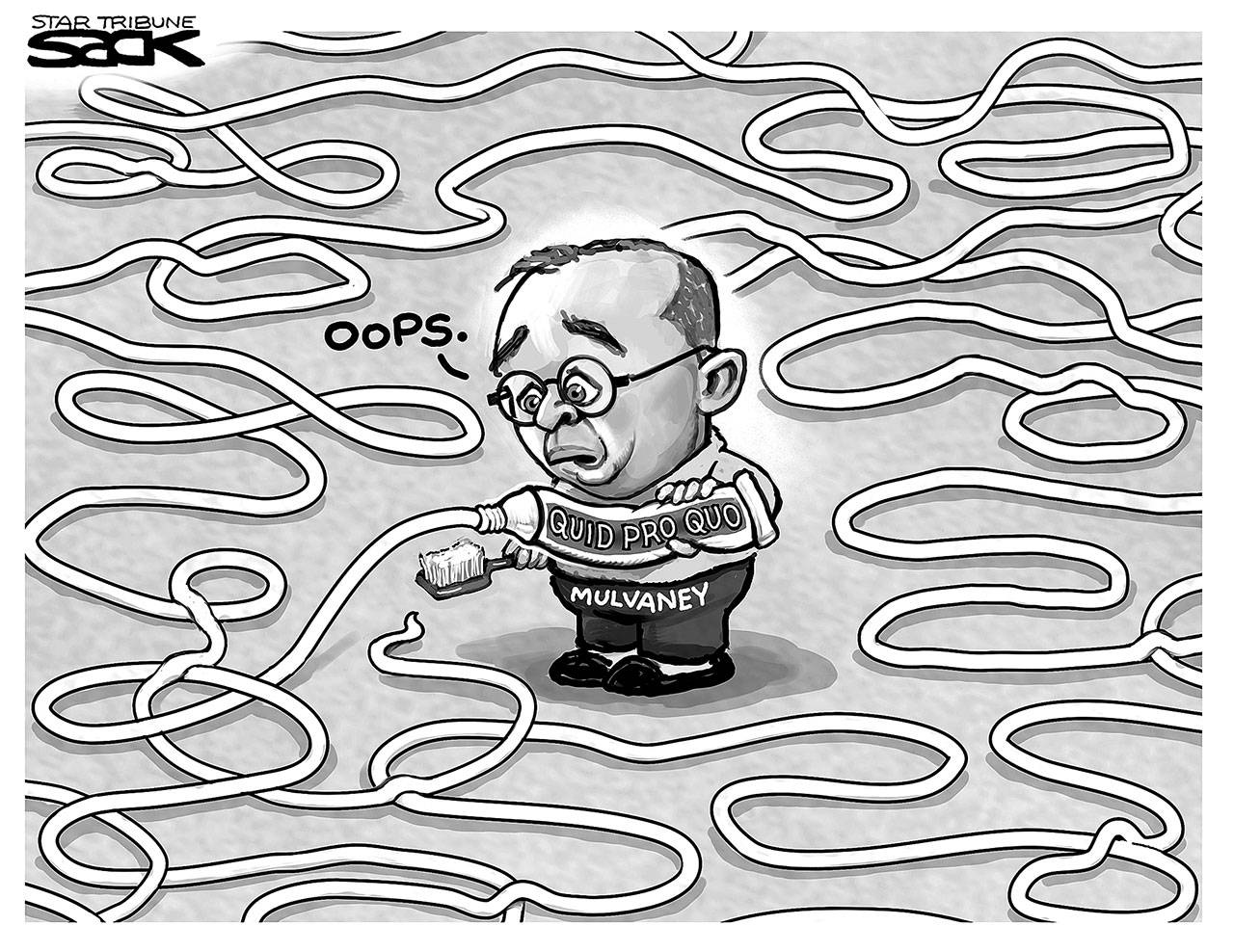A long list of aides to President Donald Trump could have appeared in the House impeachment hearings to defend his efforts in Ukraine, especially since the president insists everything he did was “perfect.”
Gordon Sondland, Trump’s ambassador to the European Union, rattled off their names when he testified: Vice President Mike Pence, Secretary of State Michael R. Pompeo, acting White House Chief of Staff Mick Mulvaney, former national security adviser John Bolton, Energy Secretary Rick Perry.
“Everyone was in the loop,” Sondland testified, and the address list on his emails backed him up.
But Trump told his lieutenants to refuse the House Democrats’ requests. Even if he thinks the rules were unfair, it suggests a lack of confidence in his own case.
The president said he’s thinking about sending Congress a written statement, but given his bottomless record of dishonesty it wouldn’t be worth the paper his lawyers wrote it on.
Of all the missing witnesses, though, Mulvaney stands apart.
Aside from Trump and his freewheeling lawyer Rudy Giuliani, Mulvaney knows the most about the attempt to muscle Ukraine into investigating Joe Biden and other Democrats.
It was Mulvaney, witnesses said, who organized the “unofficial channel” of envoys who negotiated with Kyiv: Sondland, Perry and special envoy Kurt Volker.
It was Mulvaney who cut Bolton and his staff out of the negotiations, and ignored their objections to the politically motivated probe, to the point that Bolton denounced the machinations as a “drug deal.”
It was Mulvaney who carried out Trump’s order to block nearly $400 million in congressionally mandated military aid to Ukraine in July. The aid was released only after Congress began to investigate in September.
It was Mulvaney who set up the now-infamous July 25 telephone call when Trump asked Ukrainian President Volodymyr Zelensky to investigate Biden and a debunked conspiracy theory from the 2016 election.
And in a scandal where Republicans have complained about a lack of firsthand witnesses, it was Mulvaney who worked next to the Oval Office and talked with the president almost every working day.
Other administration officials were not as central. Pence was briefed on the scheme, one witness said, but it’s not clear what he did. Pompeo will be remembered for his shameful decision to abandon his ambassador in Ukraine, Marie Yovanovitch, when Giuliani and his clients demanded she be removed.
As for Bolton, he has signed a lucrative book deal that he seems to consider a higher priority than assisting an impeachment investigation.
But Bolton wasn’t running these negotiations. The man in charge was his rival for Trump’s favor, Mulvaney.
That made sense. The political-dirt-for-weapons effort was “a domestic political errand,” one of Bolton’s top former aides, Fiona Hill, testified. The National Security Council staff and the U.S. Embassy in Kyiv, in contrast, were “involved in national security foreign policy. And those two things had just diverged.”
Mulvaney’s management of the “irregular channel” helps explain, in retrospect, his disastrous news conference on Oct. 17, when he injudiciously acknowledged a quid pro quo.” He had been in the middle of the major decisions, and wanted to defend them.
“I was involved with the process by which the (military aid) money was held up temporarily, OK?” he said.
At the time, Trump and his allies were still insisting there was no quid pro quo in their dealings with Ukraine.
Mulvaney knew that argument was untenable. So he offered a more sophisticated version: Yes, Trump asked for a trade, but that’s normal in diplomacy.
Last week, several Republican lawmakers said much the same thing. But when Mulvaney spoke, he was guilty of premature candor.
Besides, he still works for Trump, whose position (NO QUID PRO QUO!) remains unchanged no matter what the evidence shows.
Mulvaney’s problems go beyond one bungled news conference, though. He’s a terrible chief of staff. Make that “acting” chief of staff; he’s still on probation after 11 months in the position.
One of the most important parts of any chief of staff’s job description is telling a headstrong president when he’s wrong.
“Someone has got to be a guide that (says) ‘Mr. President, don’t do it.’” Mulvaney’s predecessor, John F. Kelly, told a conference last month. “Don’t hire someone that will just nod and say, ‘That’s a great idea, Mr. President.’ Because you will be impeached.”
But Mulvaney got his job last December partly by reassuring Trump that he wouldn’t be as tough as Kelly, a retired Marine general. On that count, he’s delivered —with disastrous results.
When Trump gave Turkey a green light to invade northern Syria and expel Kurdish fighters who had been U.S. allies, Mulvaney didn’t talk him out of it.
When Trump decided to hold next year’s G-7 summit meeting at one of his resorts in Florida, Mulvaney did not resist. Only when Republican senators revolted did Trump back down.
And now Mulvaney has helped Trump blunder into impeachment —without even getting the Ukrainian investigation of Biden that he wanted.
So far, the chief of staff isn’t offering much of a defense of his boss’ actions, except for a statement from his lawyer complaining that the House’s witnesses didn’t have much firsthand evidence to share.
There’s a remedy for that, of course. The White House can send up a witness who works with Trump firsthand, knows most of the facts, and has waived most of any claim to executive privilege by talking: Mick Mulvaney.



